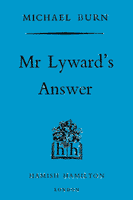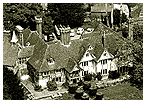by Michael Burn
The story of
George Lyward and Finchden Manor
First published
1956 by Hamish Hamilton Ltd
- All Rights Reserved
Abridged
for the World Wide Web
CHAPTER ONE
|
Chapter
1
Download |
FINCHDEN Manor was a timbered black-and-white caterpillar of a house, with a long lawn and a rose-garden, a mile from the demure country town of Tenterden. The older part of the building was Jacobean, the rest a Victorian imitation tagged on. The bays overhung, and one was supported on huge struts, like an old tree. The house looked beloved; and at night enchanted. Till ten o'clock every window blazed. The voices were all young. Chopin came from one room, boogie-woogie from another, and there was nothing haunted; but later, after the lights were out, the house withdrew into itself, moonlight smoothed out bulges and slants, and tiers of zebras seemed to have left their stripes up and down the walls A hedge hid it from the road. You entered from the courtyard, and knew at once it could not be a private house. Even if no boy scampering like a monkey, or monkey scampering like a boy ran past, you knew; from the outbuildings, the field with its home-made goalposts, the pond that some boy always wanted to turn into a swimming bath, and the raggedness of the high cedars. I think of it in two aspects, with which I associate two sides of what I witnessed there. The road skirting the townward side, though small and carrying little traffic, linked London directly with the sea. That way the boys walked to the cinema, the library, the shops, or to meet a girl; that way lay houses, newspapers, regular communications, and the postman came. The other way a lane slunk past the old brick pillars of the gateless drive, and after a few yards dropped rapidly to sea-level. You realised that the house was on a long ridge commanding a narrow valley. Very few houses were visible, and those few farms. Dense woods, from which flashed one white windmill, smothered the opposite slope, and southward the valley broadened in dyked pastures to the marshes. Sheep roamed them through spring and summer; in winter they were flooded and the floods would freeze. I used to walk that way, sometimes at night, and the owl became its voice. The marshes had their legends, and were talked of as being strange and unlike other country. The sun sank boldly in front of the house, behind the four pinnacles of Tenterden Church, while here at the back the moon stole up, the air grew colder, the outlines less secure. A white mist rose out of the sodden ground, as if the sea that had covered it hundreds of years before had left a ghost. Evening after evening this mist rose, until it had breasted the ridge and islanded the four pinnacles and carved tower, which seemed to float. Bungalows, landladies, esplanades, were not far off; but here the land had not yet surrendered, and you could easily go out of sight of habitation and feel lost. The tower is a mark for miles; I imagined sailors straffling their eyes in the old days, along a coast that has remained treacherous. Thus, on the Tenterden side, things were as they are familiar to most of us from newspapers, the ground was built on and 'developed', life lived according to convention, nothing went too deep. The other side seemed still to be waiting; not for the builder and contractor, but explorers. It was open and exciting. The house stood fast between the two - tranquil, set apart, able to disarm violence, absorb tragedy and forget both; a place of occasional squalls, yet one of the gayest and most peaceful I have ever known, and the work done there among the noblest. Dr Selwyn first took me there and introduced me to Mr Lyward at the time of the notorious Craig-Bentley case. Two boys had gone out armed one night and, when pursued, one of them had killed a policeman. The whole country had become disturbed, not only by our responsibility for hanging one of the boys, but because crimes of this kind were being reported every day. Decent parents read the newspapers and wondered: 'If in that home, why not in mine? Do I know so little of my own child?' They became so eager to be offered cures for disorders hitherto unthinkable, that dozens of articles were published in the newspapers by those who had - or professed to have - experience of juvenile delinquency. The answer, said Dr Selwyn, had been given for the past twenty-five years by Mr Lyward, although he had remained unknown to the public, and no newspaper had asked him for an article. Dr Selwyn knew what he was talking about, since he had sent one of his patients to Mr Lyward; this boy had previously been asked to leave two world-famous schools, and his family had been at their wits' end what to do with him. He had at once taken to Mr Lyward and already been for some time under his care; with what Dr Selwyn called amazing results. He quoted Mr Lyward as having said that anyone who wished to write about his work would need to be a poet. I was curious about the poetry, and arrived in a mood half-cautious, half-excited. We drew up in the courtyard outside a brick seventeenth century porch. A window opened from what seemed to be a kitchen; a boy looked out and stared, but said nothing. Another crossed the yard. He wore a brown leather belt, a faded leather jacket with tassels over the breast pockets, and a porter's cap set at a slouch. He was sharpening a peeled stick with a hunter's knife. He said politely, with a put-on American accent: 'Do you want Mr Lyward? I think he's in. I'll ring.' A girl came to the door and Dr Selwyn and I went in. The hall was old oak, and the polished staircase gleamed. We were taken into a big sitting-room. Reproductions of old masters hung from the panelling, and Scarlatti stood open on a grand piano; downstairs somebody was playing Bach. I sat in a deep window-seat and looked out at the garden of a well-kept country house; at the long lawn, with an ancestral cedar of Lebanon in the middle, bushes clipped in the shape of gigantic cauldrons, an old brick archway climbed by roses, and through another archway in a hedge a glimpse of the rose-garden. I heard shouting. Several boys had come out of another part of the house. I had to crane my neck, since they avoided the formal strip of garden under the window-seat. The sun shone. One was stripped to the waist; another wore a brilliant floral shirt. Two were wrestling. These were not the guests for whom the atmosphere appeared to wait. The Bach downstairs ended. Later, I was to have a dozen contradictory impressions of Mr Lyward. He looked none of the types I had dreaded finding; not a professional crank or selfconscious eccentric; not the instructor of the young, complex, but hearty in manner, who is at pains to swear and 'be like everybody else'; not a Presence, or Grand Old Man, complete with half an acre of forehead, a prophet's hair, and the kind of majestic kindliness that leaves you admiring, but oppressed. He was of middle height and looked frail. He had a slightly abstracted air, and held his right hand over his heart, as if taking an oath or apologising for a hiccup. 'Do you play the piano?'
he asked me The group of boys on the lawn were playing a game everybody knows. One stands in the middle of a circle, while the others throw a ball to one another and try to hit him. They looked healthy and happy. 'You wouldn't have thought, would you?' said Mr Lyward, 'that the Lincolnshire County Council sent me that one' - he pointed - 'with a note that he had the highest possible criminal potential. And that one boasted when he came to us that he had beaten the educational authorities in Somerset single-handed, and would do the same with me. Oh, and that one - does he look as if he were "all dirt and lies"? That's what his father wrote about him.' We went into Mr Lyward's room. Panelling again and reproductions on the wall; many books; Shakespeare and Shakespearian criticism, Keats and the letters of Keats, writings on education, writings on mysticism, writings on the origins of language, grammars in German. In one corner was an enormous filing cabinet, in another a bed. There were two clocks, neither of which was going. The alcove window looked out over the lawn and the boys playing there, and the afternoon sun poured in. I asked why the boys had come to Finchden. 'Oh, some of them have
been "deemed maladjusted".'
Mr Lyward answered. I
could hear the inverted
commas. 'Some... well,
they just come. They're
small, or they've been
made to feel small, and
they've wanted to feel
big. They're really little
boys, and here that's
what they become.' 'There you are!' he said.
'What am I to do with
a father who comes to
me with a boy in such
a disturbed state, that
he can scarcely even leave
his room, and after he's
been here only six months
expects him to be fit
for ordinary life?' 'Why not let them have
back their childhood?'
he asked. 'Let them do
all those things. If they
don't do them now, they'll
do much worse things later.' It was obvious that if
I were to form any idea
of the place, let alone
write about it, I must
spend some time there,
and Mr Lyward was willing,
with that aim, to make
me a temporary member
of his staff 'What shall
I teach?' I asked It was agreed that I should settle in a few weeks later. I had not the faintest idea what Finchden Manor would be like, but I did have two presentiments: one, that I was about to go back to an entirely new beginning; the other, that this might turn out to be a happy story, of which the world had need.
|

MEMORIAL | BOOK | ESSAYS | BBC | AUTOBIOG | PHOTOS | ARTICLE | NOTES | FELLOWSHIP| OLD BOYS
http://www.finchden.com

 M.B.
M.B.
